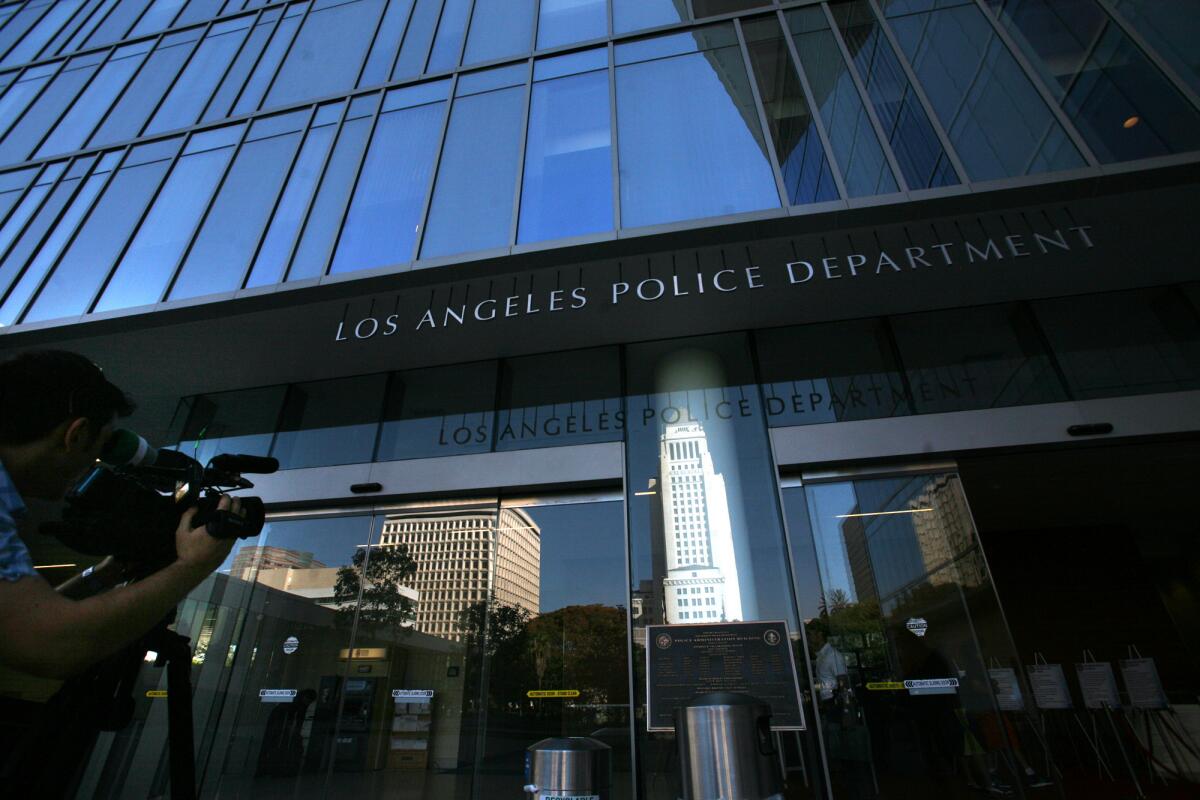L.A. Police Commission clears officers in shooting of man with knife, but faults tactics

- Share via
The Los Angeles Police Commission ruled Tuesday that the fatal police shooting of 34-year-old Alex Flores Jr. as he charged at an LAPD officer with a kitchen knife in November was justified and within department policy, though they disapproved of the tactics used in the lead-up to the shooting.
The 4-0 ruling — which matched the findings of LAPD Chief Michel Moore — came during a closed portion of the commission’s virtual meeting Tuesday, after a public portion in which Flores’ sister and parents denounced the shooting as unnecessary and racist and called for the officer who opened fire to be prosecuted.
The shooting occurred shortly before 8:15 a.m. on Nov. 19 near East 28th Street and South Central Avenue after a witness reported seeing an agitated man walking with a knife down Central in an area where children were walking to school.
Body-camera video released by the LAPD in the days after the shooting showed several officers running down the street toward Flores. One pulled out a Taser, which he would later deploy without striking Flores, while the officer who shot Flores pulled his handgun as he screamed at Flores to drop the knife.
“Don’t come at me!” the officer then yelled as Flores rushed forward at him. The officer fired multiple times until Flores fell to the ground.
The commission ruled unanimously that the drawing of weapons by multiple officers, the use of the Taser and the fatal shooting were all within department policy, warranting no action against the officers.
However, they expressed “administrative disapproval” of the tactics used by a sergeant who was serving as a supervisor at the scene, a detective and two police officers, and ordered a tactical debriefing for one officer.
In a report on his own findings that was presented to the commission, Moore wrote that he would have preferred if the sergeant leading the response had “slowed down the intensity of the incident and communicated a tactical plan” to the other officers before they ran up on Flores on the street — including by designating one officer to make contact with Flores, another to provide cover for the first officer, and a third to be in control of less-lethal weapons that could have assisted in taking Flores down without killing him.
Instead, “no plan was discussed as to how they were going to handle the incident,” Moore determined.
The commission’s decision means no officers will be reprimanded for their actions in the incident, though additional training has been provided, according to Moore’s report.
That outcome stands in stark contrast to what Flores’ family members had called for hours before — which was for the officer who shot Flores to be charged criminally and prosecuted for his killing.
Flores’ sister, Amanda Flores, said her brother was struggling with mental illness. Three days before he was shot, she said, she had found him at their parents’ house paranoid and afraid of nameless people who he believed were out to get him.
“He said to me that there was people watching him, stalking him,” she said. “I witnessed how paranoid he was.”
She said that the video showed her brother was pointing the knife at himself, not the officer, and that police should have approached the situation differently.
Instead, they “took the easy way” and shot him multiple times, an outcome she said would not have befallen a white person in his shoes.
“What type of system do you all serve?” she asked the commission. “Clearly this was a racist murder.”
“My son was not a criminal,” Flores’ mother said in Spanish.
Commission President Eileen Decker thanked the family for sharing their thoughts, and said the commission would “evaluate the case fairly and impartially in accordance with the law.”
More to Read
Sign up for Essential California
The most important California stories and recommendations in your inbox every morning.
You may occasionally receive promotional content from the Los Angeles Times.










